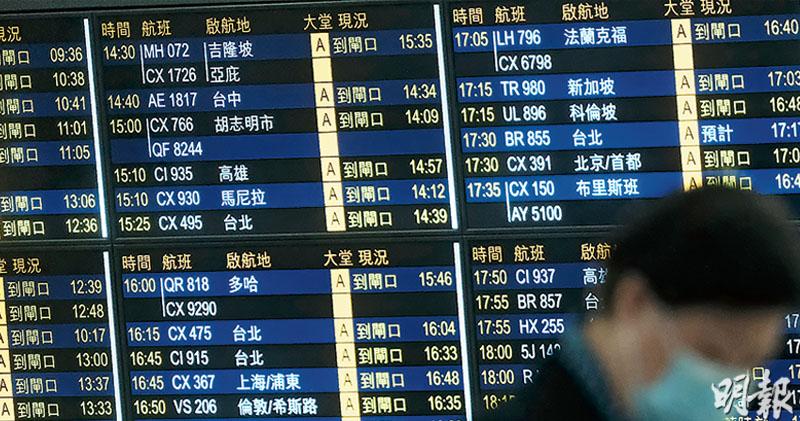Many European Union countries, Canada, India and other at least 40 countries have banned the entry of British passenger planes. The Hong Kong government has also tightened the Prevention and Control of Diseases (Regulation of Cross-Border Transport and Arrivals) Regulations (Chapter 599H). Those who have stayed in the UK for more than two hours in the past 14 days are prohibited from boarding and entering Hong Kong, including Hong Kong residents. The government requires those arriving in Hong Kong from the United Kingdom on December 2 to be forced to stay at home for an additional 7 days in addition to compulsory quarantine on the 14th, until there is a third test result on the 19th or 20th, and offenders will be fined 5000 yuan; The amendment allows the government to extend the mandatory quarantine period to more than 14 days if necessary, and it will be announced as soon as the guild passes.
In the past two weeks, 17 cases were imported from England, accounting for 21% of the same period
From this month to yesterday, 5,053 people arrived in Hong Kong from the United Kingdom. In the past two weeks, there were 17 imported cases from the UK, accounting for 21% of the 80 imported cases in the same period. Chen Zhaoshi said that there will be no British passenger airlines coming to Hong Kong for the time being. The government has never imposed such strict regulations on any region in the past, but the British variant virus is coming and the transmission rate is 70% high. And many overseas students return to Hong Kong. It is necessary to prevent the virus. Proliferate in Hong Kong and try our best to ensure that it does not leak.
Does the ban on Hong Kong people returning to Hong Kong violate the Basic Law?
Chen Zhaoshi: Safe Practice
For the first time since the outbreak, Hong Kong residents are prohibited from returning to Hong Kong. When asked if there is any conflict with the Basic Law’s protection of Hong Kong people’s freedom of entry and exit, Chen said that he had communicated with the Department of Justice and considered it a safe practice.
The Dean of the Faculty of Medicine of the University of Hong Kong, Leung Zhuowei, said that no variant virus strain has been found in the imported cases in the UK, and will analyze the confirmed samples from the UK this month. He said that the Hong Kong University team estimated that the infectivity of the variant virus would increase by 75%. Once imported into Hong Kong, the epidemic could worsen (see separate draft).
Chen Zhaoshi said that those who are under hotel quarantine and arriving in Hong Kong from the UK can continue to be quarantined at the hotel or go home. However, depending on the situation of the hotel, special car transfer arrangements will also be studied. A spokesperson for the Food and Health Bureau stated that, except on the 19th or 20th day for testing at the community testing center or returning to the place of stay, quarantine persons are not allowed to take public transportation other than taxis. Those who have completed the quarantine on the 14th can take a taxi home from the hotel; The new mandatory testing takes effect today, and those who enter the country on or before the 2nd of this month are now forced to stay home and ban their feet.
Yuan Guoyong: Early extension of the quarantine period is now too late
Professor Yuan Guoyong of the Department of Microbiology at the University of Hong Kong said on TVB that the extension of the quarantine period for overseas arrivals was too late. The variant virus appeared in September or October in the UK, and there are currently 2,000 confirmed cases.
The British variant virus has been found in the Netherlands, Denmark and other places, and Chen Zhaoshi said that the situation will be closely monitored. Xu Shuchang, chair professor of the Department of Respiratory System at CUHK, said that in the future, we need to observe the epidemic in Europe and other countries. If a country has a variant virus outbreak like the United Kingdom, it may be considered to stop related flights. At present, the most important thing is to “enforce” the quarantine of overseas arrivals. He believes that it is more difficult for the government to arrange a special car to send people who have completed the hotel quarantine on the 14th to their homes. The address of each person is not concentrated and it is best to continue the quarantine at the hotel.
Gathering restriction order masks to extend the ban on evening dine-in to 1.6
Chen Zhaoshi described the epidemic in Hong Kong as “the most severe and critical moment.” The development of the epidemic in the next two weeks will not only depend on the ability to block the import of the British variant virus, but also on whether the public can restrain and refuse Christmas and New Year inter-family gatherings.
The current social distancing measures have not been increased, and the two-person restriction order, mask order, and ban on dinner in the evening market will continue until January 6. Xu Shuchang said that the government is also considering the impact on the economy and enterprises. It is expected that enterprises still hope that enterprises and citizens will cooperate as much as possible. However, he said that if the number of confirmed diagnoses in the next week is still high, the proportion of unknown sources is still high, and there is still a large number of people in the market, the government must consider shortening store hours, closing non-emergency stores, and considering stay-at-home orders at the last minute.
Ming Pao reporter
(The fourth wave of the epidemic)
■Ming Pao Reporting Hotline:[email protected] / 9181 4676
–


